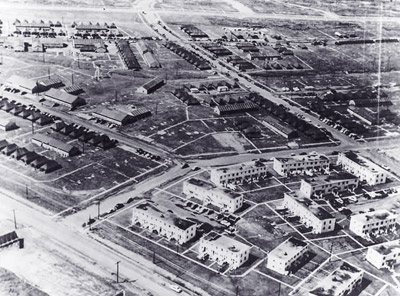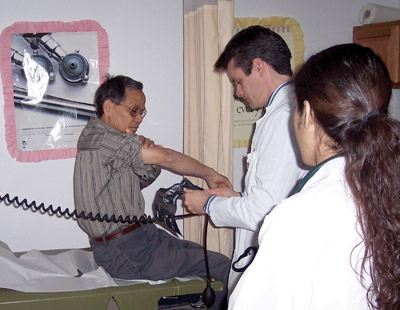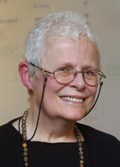
It was called “Miracle City” by reporters who wrote about the federal project to house the influx of aircraft workers landing in Wichita during World War II. Planeview, built in 15 months, opened in February 1943 as the largest of three defense villages located in and near Wichita.
Its 4,382 homes were nearly next door to the new Boeing plant where the war’s important B-29 long-range bomber was being built. When it was fully occupied 11 months later, Planeview was Kansas’ seventh-largest population center with its own schools, police and fire departments and retail stores. People from 42 states and a few foreign countries called Planeview home then.
It was meant to be temporary housing; the government planned to tear it down after the war. But that didn’t happen. Some residents wanted to stay in Planeview, which eventually became part of Wichita. Planeview, along with the smaller defense communities of Beechwood and Hilltop Manor, had become “an unintentional experiment in social reorganization and an ongoing and far-reaching lesson in community identity,” wrote researcher Julie Cartwright in the article “Want to Build a Miracle City? War Housing in Wichita” in the winter 2000/2001 issue of Kansas History: A Journal of the Central Plains.
Today there are still lessons to be learned from Planeview.
Just ask Toni Pickard, a longtime WSU faculty member in health service management and community development in the physician assistant department. For years she taught about cultural issues and community healthcare development. She read scholarly books and journals on the topics.
But in Planeview — where 39 languages are spoken and 94 percent of the children in the neighborhood school qualify for free or reduced-fee lunches — is where she gained a real understanding and appreciation of those issues, she says.

Options for Planeview, began 10 years ago with the
offering of parenting classes. Today, HOP encompasses
a low-cost, safety net dental clinic and a health clinic,
which is staffed by a WSU physician asistant faculty
member and PA students. In the center is Richard
Muma, associate professor and chair of WSU’s PA
department.
Through Healthy Options for Planeview, which Pickard began as a class project 10 years ago, students are gaining that same understanding. Through the decade, 30 WSU departments and seven other universities have participated in various projects.
Pickard had worked for years at a small outreach clinic in the neighborhood’s Brookside United Methodist Church as part of her own church’s mission work. But she saw that more needed to be done to reach more residents, particularly those of the Asian community. “I wanted to start something that would open up health care to the other people in the neighborhood,” she says. “I wanted students to get experience working with people in the community who have real needs.”
Her class project, developed with the help of then-McNair Scholar Mary Romero ’98/02, initially offered parenting classes. Today, the community health project encom-passes a low-cost, safety-net clinic that provides dental services five days and two nights a week and a recently opened health clinic, staffed by a WSU physician assistant faculty member and PA students two-and-a-half days a week.
“Oh, we’ve come a long way, but we’ve got a long way to go,” says Pickard, HOP’s executive director and the one who has developed most of the program’s initiatives based on neighborhood surveys and on conversations with residents who’ve come to trust and respect her work.
She’s passionate about the project’s dual mission: “This is helping prepare leaders of tomorrow while bringing services to the community. It’s an enormous asset to our students, both in healthcare and social service areas.”
In today’s mobile and global society, healthcare professionals need experience working with people of varied cultural and economic backgrounds. “We can’t continue to educate students as if we’re a homogenous society, and places like this help,” she says.

As Pickard shows a visitor around HOP offices, she talks about the multiple grants from local, regional and national foundations and agencies and the partnerships that have helped HOP. Part of a Department of Health and Human Services grant provided money for the new PA clinic. A new partnership with McConnell Air Force Base dentists will allow the dental clinic to soon expand its hours, she explains. There are collaborations with other clinics, too, such as Hunter Health Clinic, Center for Health and Wellness, and Good Samaritan.
Pickard plans to go on sabbatical next year, to write about providing services to a population such as Planeview’s and to develop a leadership succession plan for HOP. As an academic, she wants to share the lessons she’s learned with professional colleagues. As a caregiver, she wants to ensure the clinic continues beyond her direction.
She is well aware of Planeview’s history as a defense development. During a HOP-sponsored summer camp during the 100-year celebration of powered flight in 2003, neighborhood teens did a project to connect the history of Planeview, listening to stories from Planeview High School alumni, to its current history. One very real difference exists in those histories.
As Pickard noted: “We’re a part of this neighborhood now.”





